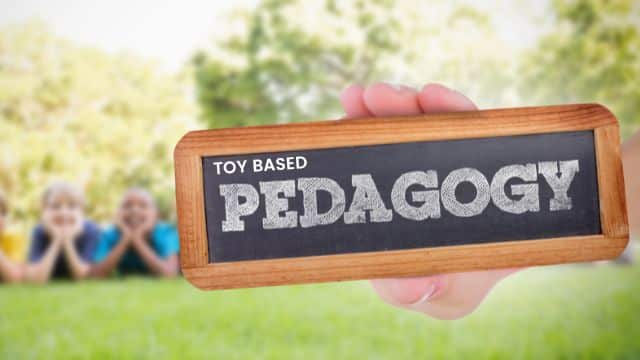Toy Base Pedagogy – Learning for Fun, Joy and Holistic Development
The National Council of Educational Research and Training (NCERT) has developed a comprehensive handbook on Toy-Based Pedagogy.
This handbook covers key aspects of Toy-Based Pedagogy and is replete with exemplars of various kinds which have the potential to transform the existing teaching-learning into a holistic and enjoyable process.
This Toy Based Pedagogy Handbook is envisaged to be used by all the teachers and parents in creating a more joyful teaching atmosphere and also evolve new toys and games in the process.
As we move forward to transform our curriculum, this handbook can prove to be an excellent source of new ideas and strategies in this direction. This Toy Based Pedagogy handbook will help in achieving these goals.
Toy-Based Pedagogy Handbook Goals and Benefits for Kids
Assessment: Assessment is a comprehensive process of collecting, interpreting, and recording information regarding the progress of a child during the learning process.
The assessment looks at learning in a continuum spread over a long duration in time and space and has the potential to enhance teaching-learning besides doing away with the fear of external examination.
Competency: Competencies are statements that specify what children will know, be able to do, or be able to demonstrate when they have completed or participated in a course or program.
Concept: A concept is a label given to a set of ideas, thoughts, or notions characterized by specific features.
Early literacy: Early Literacy is what children know about reading and writing before they read or write.
Experiential learning: Experiential learning occurs when learners are actively engaged in the selected experiences provided to them. During the learning process, the children are encouraged to participate by posing questions, investigating, experimenting, being curious, solving problems, assuming responsibility, being creative, and constructing meaning.
Formative assessment: Formative assessment refers to a wide variety of methods that teachers use in the classroom to conduct in-process evaluations of student comprehension, learning needs, and academic progress during a lesson, unit, or course.
Foundational Numeracy: The ability to read and write and perform basic operations with numbers.
Fine Motor Skills is the coordination of small muscles in movements usually involving coordination of hands and fingers with eyes.
Gross motor skills: Gross motor skills are the abilities required to control the large muscles of the body for walking, running, sitting, crawling, and other activities.
Holistic development: Development of intellectual, mental, physical, emotional, and social abilities.
Indigenous: Indigenous refers to having originated or being developed/produced from the natural or manmade material available locally.
Interdisciplinary: Interdisciplinary approach focuses on the understanding of themes and ideas that cut across disciplines. It also enables the learners to understand the connections between different disciplines and their relationship to the real world[UNESCO IBE, 2022].
Learning outcomes: Learning outcomes are statements that describe the knowledge, skills, and attitudes that students should acquire by the end of a particular assignment, class, course, or program, and help students understand why that knowledge and those skills will be useful to them.
Life Skills: Life skills are defined as a set of abilities, attitudes, and socio-emotional competencies that enable individuals to learn, make informed decisions, and exercise rights to lead a healthy and productive life and subsequently become agents of change.
Literacy: Literacy is the ability to identify, understand, interpret, create, communicate, and compute, using printed and written materials associated with varying contexts.
Literacy involves a continuum of learning in enabling individuals to achieve their goals, to develop their knowledge and potential, and to participate fully in their community and wider society (UNESCO, 2004; 2017).
Multidisciplinary: Multidisciplinary approach primarily focuses on the perspectives of different disciplines that can be used to understand and illustrate a topic, theme, or issue [UNESCO IBE, 2022].
Multilingual Class: Multilingual class refers to a group of individuals having different first languages/ mother tongues/ home languages, who have come together to achieve common learning goals.
Numeracy: It encompasses the ability to use mathematical understanding and skills to solve problems and develop a critical viewpoint with appropriate reasoning.
Pedagogy: Pedagogy refers to a set of methods and strategies used to enable learning to take place and provide opportunities to learners for the acquisition of knowledge, skills, attitudes and dispositions within a particular social and material context.
Play: Play refers to the child’s engagement with toys or games.
Problem-Solving: Problem-solving is the act of defining a problem; determining the cause of the problem; identifying, prioritizing, selecting an appropriate solution from amongst alternatives; and implementing the solution.
Sensory and Perceptual Development: Development of the five senses through visual, auditory, and kinesthetic experiences.
Toy: Toy refers to a local, indigenous popular toys or games or a puppet which children love to play with, create, listen to, touch, and watch such as tops, dolls, racing cars, rattles, aeroplanes, kites, dancing and singing puppets, etc. Source: ncert
Click here to Download Toy-Based Pedagogy a HandBook
CBSE Sample Papers | CBSE Circulars | Quizzes | Study Material
Join our Premium Telegram and Whatsapp Channel for More News and Updates
For the Latest Educational News (CBSE, ICSE, and State Board News) and live news updates, like us on Facebook or follow us on Twitter and Join our Premium Telegram Channel. Read more on Latest Exams & Results News on Shikshapress.com.

